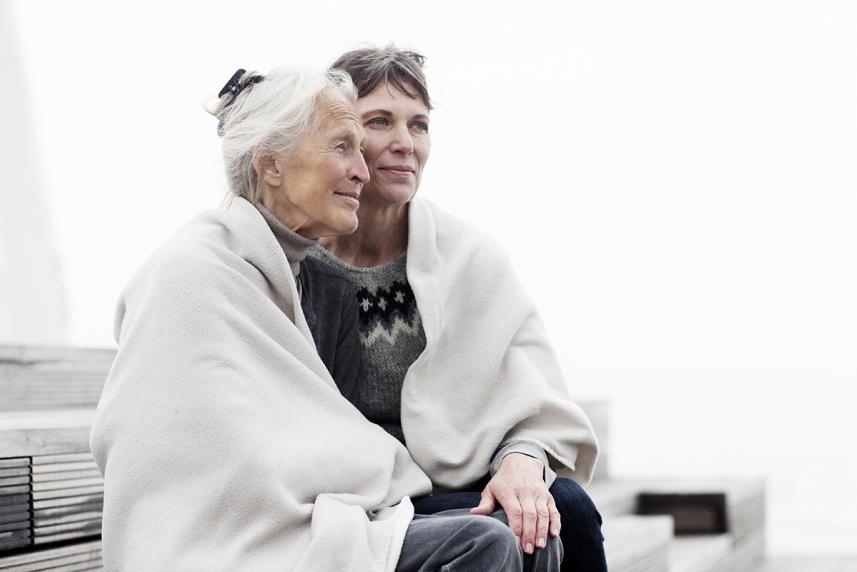
The Optum Store has a national network of virtual health professionals who can help you right from the comfort of home.

Knowing a loss is coming isn’t easy. Learn more about what anticipatory grief is, why it happens and tips on how to ease the pain.
When someone you love is diagnosed with a serious or terminal illness, you may feel like your heart is breaking a little more every day.
And even though your friend or relative is still alive, your grieving process may have already begun. This experience is called anticipatory grief. And it’s incredibly common among caregivers, loved ones and even patients themselves.
“Anticipatory grief is a real experience and a real form of grief,” says Jill Cohen. She’s a New York City–based grief counselor for children and adults. While anticipatory grief may be a difficult journey, it’s one you can navigate. (If you need some help along the way, our licensed therapists are standing by.)
It’s an emotional and psychological response to knowing that a loss is coming. The term is used more often when talking about the loved one, friend or family member who’s anticipating the death of the person who is sick, not the patient.
It typically surfaces when the loved one is diagnosed or with the start of a big decline in the person’s health, says Cohen.
These feelings of loss can also occur when someone begins to lose their memory or cognition from Alzheimer’s disease or other forms of dementia. “Feeling like your loved one is becoming a different person can cause a sense of loss before your loved one is gone,” says Cohen. (This can also be called ambiguous grief.)
Both the patient and their loved ones can experience a variety of symptoms as the patient enters the final stage of their illness. And they can manifest differently for different people in the family.
These may include:
One study in the European Journal of Cancer Care involving advanced cancer patients showed that hopelessness and self-consciousness are the strongest emotions felt during anticipatory grief. People might feel self-conscious because they may not want to add to anyone's suffering by showing their grief.
Along with those feelings, caregivers may also experience other forms of loss, according to the Family Caregiver Alliance (FCA). They include:
All these can add to the weight of the impending death. Patients have to adjust to loss and changes, too, though in different ways, says the FCA. They may struggle with losing mobility, dignity and a sense of worth.
Anticipatory grief happens before the death of a loved one. Bereavement is the period of sadness after losing a loved one.
Anticipatory grief can be a long process, sometimes lasting years. It can also be a time of high anxiety and sadness. “You might also be actively caregiving for the ill loved one while continuing a life with that person, often under much duress,” Cohen says.
You’re trying to keep your loved one comfortable, and you might be making health and financial decisions on their behalf and interacting with medical staff, says Cohen. “The griever is living in high-alert mode,” she says. That’s especially difficult because with a terminally ill person, there is so much going on at once. You’re constantly monitoring for any new change, obstacle or even a drop of hope.
One difference with anticipatory grief compared to a sudden death is that people have time to adjust to the idea of the loss, Cohen says. “Many times loved ones can resolve unfinished business and prepare for the person’s absence,” she says.
You have a chance to say what you always wanted to. You can make amends. And you can make the most of the time you have left together.
Still, none of these things makes it any easier. And going through anticipatory grief can be overwhelming. It can become so intense that it interferes with your ability to cope. Here are a few helpful strategies:
Talk about it. Opening up to someone and feeling supported are vital. You might want to talk to friends, family, a counselor or a support group.
Prioritize self-care. “Any kind of attempt at self-care, even a small one, is helpful,” says Cohen. Go for a walk, experience nature, get a massage, take a bath, listen to music, read a book or take some time off if you can.
Educate yourself. Learning about your loved one’s condition can reduce the stress of trying to figure it out on your own, says Cohen. You can learn about their symptoms, treatment, potential side effects and prognosis. Your loved one’s health care team can provide answers about what to expect.
For those who’ve already experienced anticipatory grief, post-death grieving can feel lighter. You may feel relieved knowing that your loved one is no longer in pain, discomfort or suffering. “Bereavement can then be a time to reflect and adjust to your new normal,” Cohen says.
This isn’t to say that your loved one’s death is easier. Even though it was expected, it can still come as a shock, according to the American Cancer Society. What’s important to remember, says Cohen, is that grief is different for everyone. It’s not linear. And there’s not one way to process it.

The Optum Store has a national network of virtual health professionals who can help you right from the comfort of home.
Additional sources
Difference between anticipatory grief and bereavement: Omega Journal of Death and Dying. 2008. “Improving Psychological and Psychiatric Aspects of Palliative Care”
Anticipatory grief, hopelessness, and self-consciousness: European Journal of Cancer Care. 2008. “Preparatory Grief, Psychological Distress and Hopelessness in Advanced Cancer Patients.”
Facts about anticipatory grief and bereavement: National Cancer Institute. Grief, Bereavement and Coping with Loss